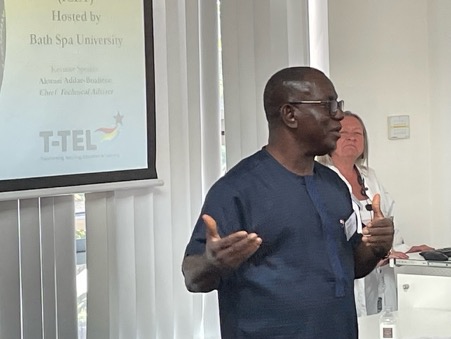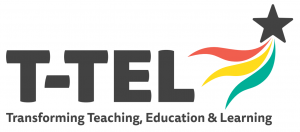
Akwasi Addae-Boahene (in front) and Bea Noble-Rogers (behind) at the ICET conference
T-TEL’s Chief Technical Advisor, Akwasi Addae-Boahene and Bea Noble-Rogers, a Key Advisor on Curriculum joined delegates across the world to attend the 64th World Assembly of the International Council on Education for Teaching (ICET) on 21st to 23rd June 2022 at the School of Education, Bath Spa University in the United Kingdom.
The conference, under the theme “Building Creative Global Teacher Education Communities Post-Pandemic: International Research-Based Collaboration” served as a platform to share relevant ideas and findings to foster interactive dialogues to improve teacher education globally.
Delivering a keynote on “Reforming the Teacher Education System in Ghana: The Path to Systemic Impact”, Akwasi emphasised that towards 2015, Ghana was actively searching for new ways of learning and new organizational forms for education that will be consistent with the drive towards the 4th industrial revolution powered by digital technology and data, the SDG 4, and the emergent social and economic reality of the 21st Century. The ambition therefore is to create a teacher education system that promotes equity, creativity, critical thinking, technological expertise, problem solving and communication skills for both teachers and learners.
“Ghana’s teacher education reform aims to prepare a new generation of teachers who can give children the confidence to become future-ready in a more digitally enabled and fast-changing world. These teachers will be equipped for the practicalities of the modern-day classroom by creating a real-world context in which to apply knowledge,” says Akwasi.
He further highlighted the systemic impact of the teacher education reforms which led to the transition of the T-TEL Project from a bilateral aid project to a Ghanaian not-for-profit organization providing high-quality technical advice and support to Ghana’s education reforms.
In a reflective mode, he highlighted some of the key lessons learnt in the delivery of the comprehensive teacher education reform agenda in his keynote address as:
– Strong political leadership and wholesale government buy-in are the most critical drivers of sustainable and large scale system reforms.
– Multi-stakeholder and political engagement and participation are always critical for impact, ‘Harnessing the wisdom of (informed) crowds’ and ‘Building a coalition of the willing.’
– Engagement, support and working through Agencies of the Ministry of Education, Universities and Colleges of Education to shape their progress motivated these institutions to make progress
– Persistence, tact, and patience with stakeholder engagement processes by policymakers ensured responsiveness across the various reforms
Bea Noble-Rogers in sharing her experience at the conference said, “Akwasi’s keynote speech was received as one of the most positive stories of change and the positive, genuine impact of large–scale educational reform. Many delegates commented on the quality and passion of his in-put. It shone out amongst all the presentations.”
The conference ignited a variety of intellectual conversations. This provided an opportunity to reflect and focus on how to strengthen teacher education and search for new ways of teaching and learning that will be consistent with the drive towards the 4th industrial revolution powered by digital technology and data, the SDG 4, and the emergent social and economic reality of the 21st Century.
